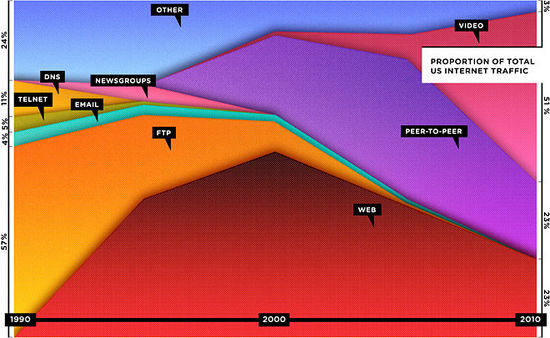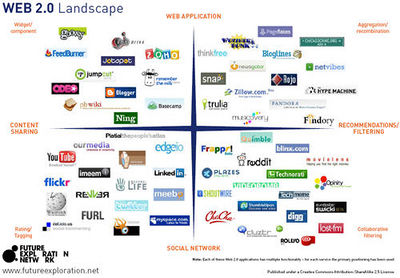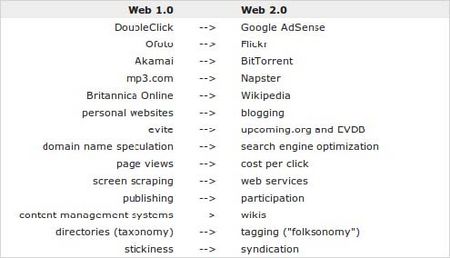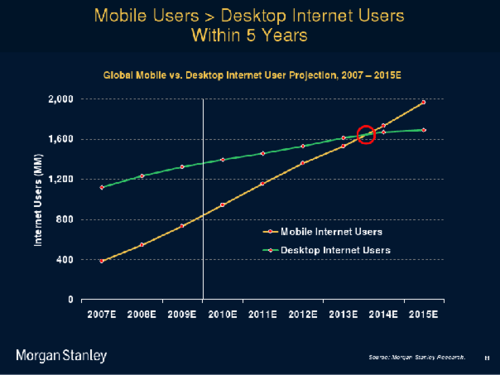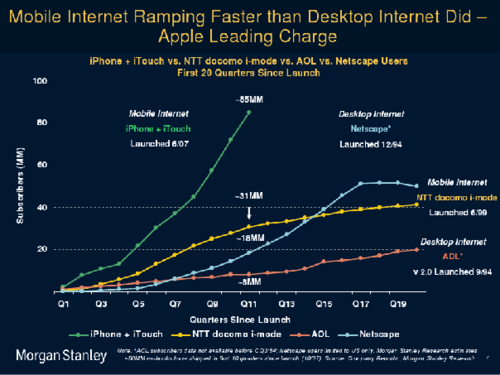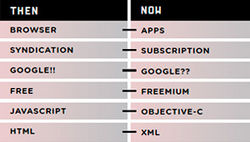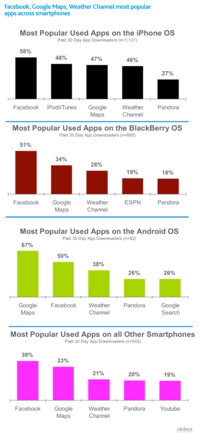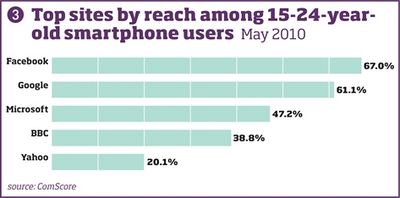The Web is dead, long live the Internet
From IT
“As much as we love the open, unfettered Web, we’re abandoning it for simpler, sleeker services that just work.” by Chris Anderson
In this article published on WIRED on August 17th 2010 Chris Anderson and Michael Wolff talk about evolution of internet usage (“who is to blame: Us”, the internet user. Because internet usage depends on what users like to do surfing the net) and evolution of business model in the digital world (“Who’s to blame: Them”, the media moguls which are building oligopolies because they are pushed by capitalistic instinct).
Who’s to blame: Us
Basing on the image we can see below, Anderson takes inspiration to explain the evolution of Internet contents that users exploit. He describes how users are moving from searching in a open web to semi-closed platforms with simpler services. But this is not a news, because on march 15th 2010 a well known social community (the best known) Facebook has passed Google as most visited website, as written in this article on March 15th 2010. This trend is defined on image 1 and can be explained because of a change of users’ behaviors, based on internet evolution.
With the evolution of the usage of internet (and specifically the simplification of internet access
trough Wifi connection and faster cable connection) , the technology of Cloud computing has spread and users has started to use services as Gmail, Facebook and Youtube: the user therefore has began to be accustomed to access to the net every time and to have services everywhere from avery computer.
The diffusion of such technologies is possible also thanks to laws evolution regarding internet and connections usage, an example may be the abrogation of so called “Pisanu’s law” in Italy, where there where strong limitation of free Wifi according with the guidelines of this law.
Image 1 can be now understood: file sharing has taken the place to ftp, video and audio streaming has taken the place of peer to peer and the web is no more used (or used less than before) because the user access internet by different services or apps not surfing the web searching for different contents.
With the start of the so call “web 2.0” we have the birth of a plethora of new services based on cloud computing and based on 4 characteristics (web application, filtering/recommendation, social network and content sharing) as seen in image 2.
Web 2.0 refers to an evolution of services and user costumes that can be summarized also in image 3. But nowadays, as we said, things have moved more and services as BitTorrent, Napster, Blogging, cost per click, and syndication are changed to Video and Audio streaming, micro blogging (also tweeting), pay per action and subscription.
With the coming of mobile web, rising specifically in 2007-2008 and now spreading thanks also to new tablet PCs, now the user is really able to access internet contents wherever he is. Anderson in his article on WIRED underlined in fact the usage of apps that a normal user does in a day, he can access internet not really browsing the net, but only using applications that connect its smartphone or tablet to a specific web platform.
As Mary Meeker, Morgan Stanley analyst, said as reported in this article “the world is currently in the midst of the fifth major technology cycle of the past half a century. The previous four were the mainframe era of the 1950s and 60s, the mini-computer era of the 1970s and the desktop Internet era of the 80s. The current cycle is the era of the mobile Internet, she says — predicting that within the next five years “more users will connect to the Internet over mobile devices than desktop PCs.” As she puts it on one of the slides in the report: “Rapid Ramp of Mobile Internet Usage Will be a Boon to Consumers and Some Companies Will Likely Win Big (Potentially Very Big) While Many Will Wonder What Just Happened.”
In fact she showed this picture, that defined as mobile internet users number in 2014 will pass desktop internet users number:
And she also showed how fast mobile internet is taking place compared with Desktop PCs diffusion:
Anderson in his article then describes as apps have taken the place of browser, Google is no more used and instead of free services we have “freemium” as shown in image 6.
The item described in “now” are all about Facebook world: it works with thousands of applications, users subscribe to have be updated from their friends or partners in the network, they don’t use Google but they go directly to Facebook website (or use Facebook app), and the Facebook platform doesn’t work with simple HTML code but in PHP, on a Lamp server and the back-end is in C++, Java, Python, and Erlang.
In fact the main idea of Anderson, that the user is leaving web surfing to move to simpler and sleeker services is defined by Facebook users: they have their friends, they have their preferred news, organizations, shops and institutions in the network, they have games, they can know new people, they can mail them, they can share video and pics with them and so on…only in one platform. So, why they should leave that platform? The answer is that that they are not leaving the platform (because Facebook users’ number is still growing) but the platform will follow them! As described in this article of June 2010.
The most used smartphone’s application is the Facebook one, followed by Google maps. So internet mobility has confirmed general online trend, also confirmed by stats in image 8, that shows the upcoming trend not to browse the Net (using Google search engine) but to reach directly Facebook website, especially by among 15 and 24 years old smartphone users (that will be future adult online users and will decide as the web will evolve).
The web is died then? Or simply internet is evolving as Anderson said in the last part of his article? He suggests that the initial chaos of the Net is due to the fact that he was in an adolescent phase and now is in the hand of industrial giants that are driving the market.
We want to add that “this is NOT the end, my friend” as Jim Morrison would said, because the evolution of internet usage and users customs depends on their needs and their evolution. If we still have postcards, landline and shops in the era of email, Voip and e-commerce it means that new technologies don’t replace totally old techs but there will be a balance and the old one will find a nice (as Prof. Cantoni writes in his book INTERNET ). We are assisting now to the birth and the fast growth of mobile web, but we are attending for the happy event of the diffusion of internet TV and TV with internet connection (and apps included!).
